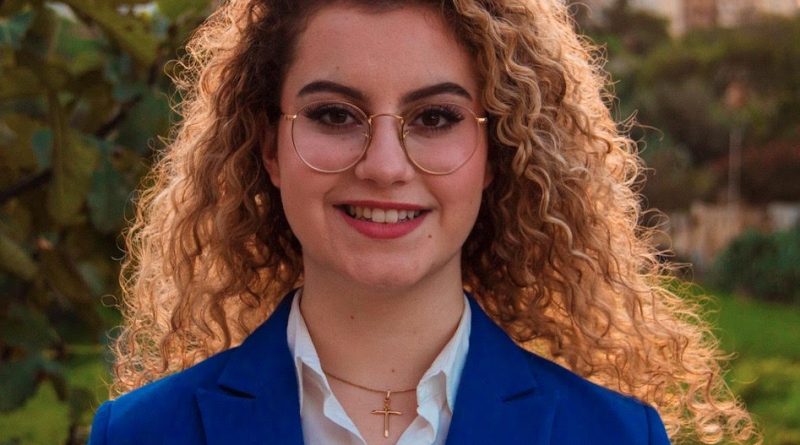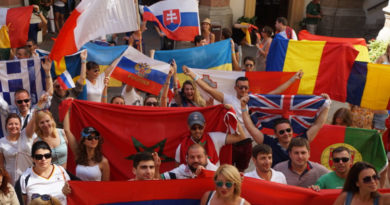Eve Borg Bonello, a good practice of youth representation in the EU.
The representativeness of young people in the main institutions continues to show no reversal of the usual and well-established age trend within national parliaments, which are generally populated by members with an average age of around 48, as recalled by recent EU27 statistics.
An ‘unedifying’ reality in terms of the inclusion of young people in the public decision-making process, capable of sustaining a gerontocratic worldview, ensuring a poor social innovation and stifling a modern political vision.
Fortunately, in such context – albeit sporadically – it is possible to come across success stories or, rather, real good practices as demonstrated in the case of the young Maltese MP Eve Borg Bonello.
Born in 2003, Bonello is a Maltese activist and politician who became famous during the 2019-2020 Maltese protests for her open opposition to former Prime Minister Joseph Muscat and the corruption scandals that triggered Malta’s 2019 political crisis. In April 2022, Borg Bonello was elected as a Member of Parliament in the 2022 Maltese general elections, becoming the youngest candidate ever elected to the Maltese House of Representatives in the country’s constitutional history. In short, a living best practice of youth representation in Europe.
We often talk about lack of inclusion towards youth and women in politics. Nevertheless, at 19, you are the youngest parliamentary representative in the history of Malta as well as the youngest exponent of a legislative chamber worldwide. How would you describe this disruptive participation in the national political landscape?
The basis of democracy is legislating on behalf of every citizen in a country, for this reason I don’t think youth and female participation in politics should even be considered something niche, it should be the norm. I’m humbled to be given the opportunity to contribute at a legislative level and to represent generation Z, a generation that lacks representation in most countries. People often regard youth as ‘the future’, I believe young people are the present. This kind of representation wasn’t previously the case in Malta, I’m sure that younger voices at high levels are bound to shake things up and offer fresher perspectives.
For your last campaign, the budget invested was about 506.40 euros. So, is it wrong to say that politics is a business just for the rich and lobbyists?
In Malta, being such a small island, politics is more personal, there is a huge contact between politicians and their constituents; therefore I feel that people vote for those politicians who truly make an effort to provide a close personal touch. With that being said, as with many things, money is a huge factor that provides resources, influence and introduces a vast network of people and help. Having such a small budget wasn’t easy at all, so I needed to get creative in my campaign; like when I realised that I didn’t have enough money to rent an office, I simply set up a pop-up office with a stand, a table and folding chairs on the Sliema front to meet with my constituents in a public space.
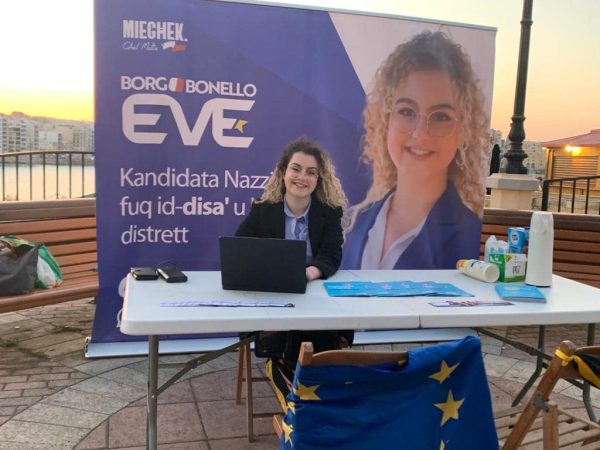
You were born on May 9, which is the day of Europe. What is your perception of the European institutions?
To me, the European Union means hope, diversity and results. Unfortunately, at the same time people see Europe as far away and detached from the common man, a sentiment growing in a country like Malta which has an island mentality. It should be the responsibility of politicians both on a European and Local level to bring Europe home and show the results of investment; and it is the responsibility of the European Union to listen and deliver, not getting stuck in the Brussels Bubble. Just like Macron is trying to influence, Europe needs reform to get this done. With that being said Malta has a growing positive perception to institutions like the European Parliament with 62% having a positive perception of it, a growing hope undoubtedly related to the fact that it is presided over by the Maltese Roberta Metsola, showing clearly that even small states like Malta are capable of having a huge influence in the Union.
How would you define your country’s political effort to support the inclusion of Maltese youth?
Malta is one of the 12 countries where the minimum age for voting is 16, the nature of younger people being part of their electorate gives them a louder, more relevant voice and boosts youth centred issues on the national agenda. A growing number of young people contest local council elections and now even general elections. However, with that being said there is also a worrying level of apathy amongst the younger generation regarding certain issues but activism is on the rise especially surrounding social issues and climate change. More has to be done, definitely, it starts with gaining the trust of younger people, and delivering results all throughout the legislature not just in the run up to elections as a shallow vote catching exercise.
And what does not seems to be taken into consideration at the EU level for the promotion of youth policies?
On a European scale there is a concerning amount of youth unemployment which definitely should be tackled more. The European Union is taking bold strides on issues young people care deeply about like climate change with the introduction of the green new deal, but action has to be swifter and realistic to every nation state, we’re not a one size fits all union.
“The Partit Nazzjonalista is a mosaic of ideas, beliefs, backgrounds”. According with your statement thinking about youth policies is there a common idea in the party? If yes what are the legislative initiatives that the PN fancy to implement in Malta once in government?
The Mosaic metaphor is central to understanding the way the Partit Nazzjonalista functions, as a Christian Democrat party aligning with the EPP, the mosaic imagery explains how the party is an umbrella coving members from all walks of life spanning several sectors of society, be it income, education level and political philosophies. For this reason, last election’s manifesto had a wealth of proposals outsourced from different stakeholders in society, with fresh ideas relating to energy, the environment, cost of living, pensions, education and so on. In terms of proposals concerning young people and students we proposed increases in maintenance grants and stipends, particularly for those students engaged in civil society and voluntary organisations as an incentive for active citizenship and rewarding those who contribute their time and resources to building a better Malta. The party also proposed travel vouchers for these students to have an opportunity to explore new horizons and realities, as well as investment to bring talent back to Malta amidst a growing brain drain. The central pillar behind these initiatives was to strengthen meritocracy, for young people to earn opportunities based on what they know not who they know, an issue all too common in a small country that faces nepotism and cronyism.
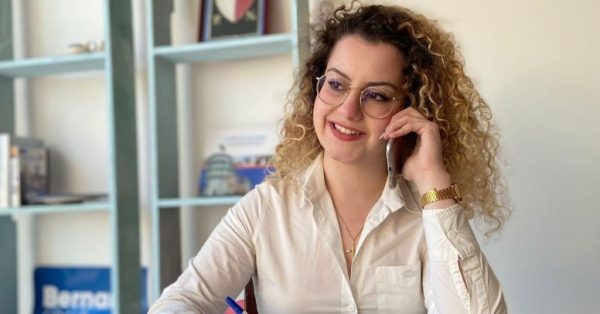
How was received by the Maltese people the election of Roberta Metsola as President of the European Parliament? Do you think she has the right skills to fill such complex and relevant role?
There was an undeniable sense of national pride and honour in our island, an unwavering sense of hope that hard work pays off and admiration for someone so talented to hail from our tiny home in the Mediterranean, for years Metsola stressed that our Nation is small in geographical size but not in capability and influence, and we Maltese shouldn’t let geographical realities hold us back, that we are part of the European family. I feel that Roberta Metsola hasn’t stopped proving that she’s the ideal woman for the job, from her work in the institutions to her brave stances on the war and invasion of Ukraine, being one of the first to visit President Zelenskyy in his war-torn country and pelging the unwavering support of the European Union.
You have been very active in promoting the rule of law in your country in the aftermath of the events related to the murder of Daphne Caruana Galizia. In your opinion, is that system of power that the journalist tried to oppose still strong in Malta?
5 years on, justice is still waiting to be served in a blatantly political murder that sent shock waves throughout the world. I remember the day it happened, I was 14 years old arriving home from school and I couldn’t believe it, and there was a general shock in which no one could accept that this could happen in a democratic European country. In 2019, years of cracks forming in the system of power culminated in unprecedented protests in the country, in a society usually apathetic it was unbelievable seeing the streets filled with anger for weeks, I had participated and gathered my friends from secondary schools and sixth forms across the island, we were all there, demanding justice. The climax of this movement of civil society led the disgraced Joseph Muscat to resign, with that being said, much is yet to be done, we’re still far away from justice. The Independent Magisterial Inquiry on the murder of Daphne Caruana Galizia declared that the Government was responsible for her assassination and that an octupus web of corruption still ran deep in the country’s institutions, politics, power and influence.
About the relationship between social media, politics and freedom of thought. you have been a victim of death threats for your views against the former Prime Minister Joseph Muscat. In your opinion what should be improved in the management of social platforms in order to ensure a more democratic dialogue and safety?
I had delivered a speech at the protest a few hours ahead of Muscat’s resignation, I was 16 and I was angry. The emotions in the country were heightened on both ends, from our movement of ordinary people furious at the state of the country and of loyal supporters of the labour government. A few hours after the speech was posted online, my phone froze from the thousands of comments and messages insulting me, attacking my family, telling me to end my life or threatening to bring an end to it violently. What followed was 3 years of going to court, I had only reported to the police the worst threats, there were too many hate speech comments to even start trying to report. I had forgiven some, as for others the Magistrate decided to award a fine and suspended prison sentences. I believe the state must take direct threats extremely seriously, they’re unfortunately all too common with those guilty of them having a sense of impunity. However there are fine lines which must not be crossed when it comes to freedom of speech and expressing one’s opinion, these lines must be drawn with the utmost caution and care as to not culminate in an adverse effect on our democracy itself. But action must be taken, because left alone, the sense of impunity turns into the environment that facilitated Daphne Caruana Galizia’s murder itself, a price she should have never been made to pay, a price that shouldn’t exist for standing up and doing ones job, and brilliantly at that.
You have stated that “politics is fun”. How politics, that often excludes youth from its priorities, can be fun for young people?
Politics isn’t a niche reserved for an elite political class in tailored suits making backroom deals. Politics belongs to the people, they have the power, and hence the right to both award it and to take it away. From a young age I firmly believed that it should be, and is, fun, because politics is what propels real change, reform and results, this doesn’t have to originate from a party manifesto alone but through every stakeholder in society, from funny and original protests and demonstrations to direct actions creating the reality people want which may otherwise fall on deaf ears. Around the world young people stand up and demand climate action, and social justice in societal issues. Our job is not only to listen, but be with them working together to find solutions to issues concerning the upcoming generation, which are normally ignored by previous generations in power, we can’t abandon young people to face tomorrow alone.
Eve Borg Bonello, una buona pratica della rappresentatività giovanile nell’UE.
La rappresentatività dei giovani nelle principali istituzioni continua a non registrare alcuna inversione di rotta rispetto al consueto e assodato trend anagrafico all’interno dei Parlamenti nazionali, popolati, in linea di massima, da esponenti con un’età media di circa 48 anni, come ricordato dalle recenti statistiche UE27.
Una realtà ‘poco edificante’ in termini di inclusione dei giovani al processo decisionale pubblico, capace di sostenere una visione del mondo a dir poco gerontocratica, assicurare scarsa innovatività sociale e soffocare la nascita di una moderna visione politica.
Fortunatamente in un tale paradigma rappresentativo – seppur in modo sporadico – è possibile imbattersi in casi di successo o, meglio, in vere e proprie buone pratiche come dimostrato nel caso della giovane deputata maltese Eve Borg Bonello.
Classe 2003 Bonello è un’attivista e politica maltese, divenuta famosa durante le proteste maltesi del 2019-2020 per la sua aperta opposizione all’ex primo ministro Joseph Muscat e agli scandali di corruzione che hanno innescato la crisi politica di Malta del 2019. Nell’aprile 2022, Borg Bonello è stata eletta membro del Parlamento alle elezioni generali maltesi del 2022 , diventando la candidata più giovane mai eletta alla Camera dei rappresentanti maltese nella storia costituzionale del Paese. Insomma, una buona pratica vivente di rappresentatività giovanile in Europa.
Si parla spesso della mancanza di inclusione dei giovani e delle donne in politica. Eppure, a 19 anni, lei è il più giovane rappresentante parlamentare nella storia di Malta, nonché la più giovane esponente di una camera legislativa a livello mondiale. Come descriverebbe questa straordinaria partecipazione nel panorama politico nazionale?
Legiferare a nome di tutti i cittadini di un Paese rappresenta la base della democrazia è, per questo, non credo che la partecipazione dei giovani e delle donne alla politica debba essere considerata come qualcosa di straordinario, ma dovrebbe rientrare nella norma. Sono orgogliosa di avere l’opportunità di contribuire a livello legislativo e di rappresentare la generazione Z, una generazione che non è rappresentata nella maggior parte dei Paesi. Spesso si considerano i giovani come “il futuro”, io credo che i giovani siano il presente. Questo tipo di rappresentanza non c’era prima a Malta. Sono certa che i giovani sono destinati a scuotere la società e a offrire prospettive più innovative.
Per la tua ultima campagna elettorale è stato investito un budget di circa 506,40 euro. E’ sbagliato dire che la politica è un affare solo per ricchi e lobby?
Essendo un’isola piccola a Malta la politica è più personale, c’è un contatto enorme tra i politici e i loro elettori; quindi ritengo che la gente voti per quei politici che si sforzano davvero di essere presenti personalmente e in modo ravvicinato. Detto questo, come per molte cose, il denaro è un fattore enorme che fornisce risorse, influenza e introduce una vasta rete di persone e di aiuti. Avere un budget così ridotto non è stato affatto facile, quindi ho dovuto essere creativa nella mia campagna; ad esempio, quando mi sono resa conto di non avere abbastanza soldi per affittare un ufficio, ho semplicemente allestito un ufficio pop-up con uno stand, un tavolo e sedie pieghevoli sul fronte di Sliema per incontrare i miei elettori in uno spazio pubblico.

Sei nata il 9 maggio, ovvero il giorno dell’Europa. Qual è la tua percezione delle istituzioni europee?
Per me l’Unione europea significa speranza, diversità e risultati. Purtroppo, allo stesso tempo, la gente vede l’Europa come lontana e distaccata dall’uomo comune, un sentimento che cresce in un Paese come Malta, che ha una mentalità insulare. Dovrebbe essere responsabilità dei politici, sia a livello europeo che locale, portare l’Europa a casa dei cittadini e mostrare i risultati ottenuti; ed è responsabilità dell’Unione Europea ascoltare e condividere risultati, senza rimanere bloccati nella bolla di Bruxelles. Proprio come Macron sta cercando di influenzare, l’Europa ha bisogno di riforme per raggiungere questo obiettivo. Detto questo, Malta ha una crescente percezione positiva verso le istituzioni come il Parlamento europeo, il 62% dei cittadini maltesi ha, infatti, una percezione positiva. Un giudizio che sta migliorando anche grazie alla presidenza della maltese Roberta Metsola, aspetto che sta dimostrando chiaramente che anche i piccoli Stati come Malta sono in grado di avere un’enorme influenza nell’Unione.
Come definiresti lo sforzo politico del tuo Paese per il sostegno all’inclusione dei giovani maltesi?
Malta è uno dei 12 Paesi in cui l’età minima per votare è 16 anni, e il fatto che i più giovani facciano parte dell’elettorato dà loro una voce più forte e rilevante e aumenta le questioni incentrate sui giovani nell’agenda nazionale. Un numero crescente di giovani partecipa alle elezioni comunali e ora anche alle elezioni politiche. Detto questo, però, c’è anche un preoccupante livello di apatia tra le giovani generazioni riguardo a certi temi, ma l’attivismo è in aumento, soprattutto per quanto riguarda le questioni sociali e il cambiamento climatico. Bisogna fare di più, sicuramente, iniziando a conquistare la fiducia dei più giovani e a ottenere risultati durante tutta la legislatura, non solo nel periodo precedente alle elezioni per un superficiale tentativo di recupero dei voti.
E cosa non sembra essere preso in grande considerazione a livello europeo per la promozione delle politiche giovanili?
A livello europeo preoccupa il costante aumento della disoccupazione giovanile che dovrebbe essere affrontato con più incisività. L’Unione europea sta compiendo passi coraggiosi su questioni che stanno molto a cuore ai giovani, come il cambiamento climatico, attraverso l’introduzione del New Deal verde, ma l’azione deve essere più rapida e realistica per ogni Stato nazionale, non siamo un’Unione a taglia unica.
“Il Partit Nazzjonalista è un mosaico di idee, convinzioni, provenienze”. In base a questa affermazione, pensando alle politiche giovanili, c’è un’idea comune nel partito? Se sì, quali sono le iniziative legislative che il PN intende attuare a Malta una volta al governo?
La metafora del mosaico è fondamentale per comprendere il funzionamento del Partit Nazzjonalista: in quanto partito democristiano allineato al PPE, l’immagine del mosaico spiega come il partito sia un ombrello che raccoglie membri provenienti da tutti i ceti sociali e che abbraccia diversi settori della società, sia per quanto riguarda il reddito, il livello di istruzione e le filosofie politiche. Per questo motivo, il manifesto elettorale delle scorse elezioni conteneva una grande quantità di proposte provenienti da diversi attori della società, con idee nuove in materia di energia, ambiente, costo della vita, pensioni, istruzione e così via. Per quanto riguarda le proposte relative ai giovani e agli studenti, abbiamo proposto di aumentare le borse di studio e gli stipendi, in particolare per gli studenti impegnati nella società civile e nelle organizzazioni di volontariato, come incentivo alla cittadinanza attiva e come ricompensa per coloro che contribuiscono con il loro tempo e le loro risorse a costruire una Malta migliore. Il partito ha anche proposto dei voucher di viaggio per questi studenti, affinché abbiano l’opportunità di esplorare nuovi orizzonti e realtà, e degli investimenti per riportare a Malta i talenti in un contesto di crescente fuga di cervelli. Il pilastro centrale di queste iniziative è stato il rafforzamento della meritocrazia, affinché i giovani possano ottenere opportunità in base a ciò che conoscono e non a chi conoscono, un problema fin troppo comune in un piccolo Paese che deve affrontare nepotismo e clientelismo.
Come è stata accolta dai maltesi l’elezione di Roberta Metsola a Presidente del Parlamento europeo? Ritieni che abbia le competenze giuste per ricoprire un ruolo così complesso e rilevante?
Si avverte un profondo senso di orgoglio nazionale nella nostra isola, un incrollabile senso di speranza e di riconoscimento del duro lavoro portato avanti da una persona così talentuosa che proviene dalla nostra piccola casa nel Mediterraneo. Per anni Metsola ha sottolineato che la nostra nazione è piccola in termini di dimensioni geografiche, ma non di capacità e di influenza, e che noi maltesi non dovremmo lasciare che la realtà geografica ci trattenga, che siamo parte della famiglia europea. Ritengo che Roberta Metsola non abbia mai smesso di dimostrare di essere la donna ideale per questo incarico, dal suo lavoro nelle istituzioni alle sue coraggiose prese di posizione sulla guerra e sull’invasione dell’Ucraina, essendo una delle prime a visitare il Presidente Zelenskyy nel suo Paese devastato dalla guerra e a raccogliere il sostegno incondizionato dell’Unione Europea.
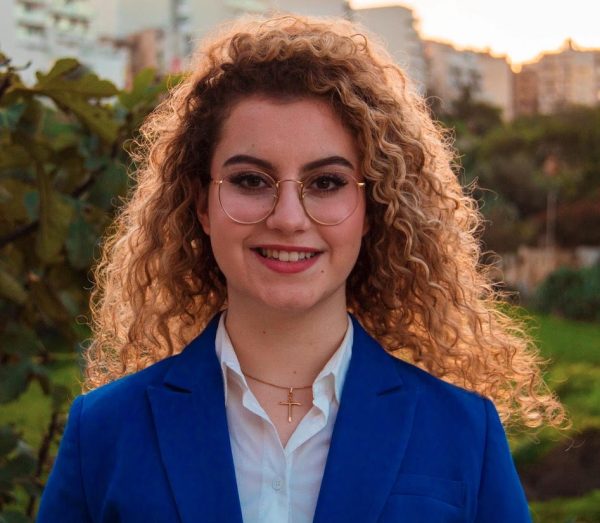
Sei stata molto attiva nella promozione dello Stato di diritto nel tuo Paese all’indomani degli eventi legati all’omicidio di Daphne Caruana Galizia. Secondo te, il sistema di potere contro il quale la giornalista ha cercato di opporsi è ancora forte a Malta?
A distanza di 5 anni, la giustizia sta ancora aspettando di essere fatta per questo omicidio palesemente politico che ha avuto ampia risonanza in tutto il mondo. Ricordo il giorno in cui è successo, avevo 14 anni, tornavo a casa da scuola e non riuscivo a crederci: c’è stato uno shock generale in cui nessuno poteva accettare che questo potesse accadere in un Paese europeo democratico. Nel 2019, anni di crepe nel sistema di potere sono culminati in proteste senza precedenti nel Paese, in una società solitamente apatica è stato incredibile vedere le strade piene di rabbia per settimane, io avevo partecipato e riunito i miei amici delle scuole secondarie e dei quartieri di tutta l’isola, eravamo tutti lì, a chiedere giustizia. Il culmine di questo movimento della società civile ha portato poi il disgraziato Joseph Muscat a dimettersi, ma ciò detto, molto deve ancora essere fatto, siamo ancora lontani dalla giustizia. L’inchiesta della magistratura sull’omicidio di Daphne Caruana Galizia ha dichiarato che il governo è responsabile del suo assassinio e che una rete di corruzione è ancora presente nelle istituzioni e nella politica del Paese.
A proposito del rapporto tra social media, politica e libertà di pensiero, sei stata vittima di minacce di morte per le tue opinioni contro l’ex primo ministro Joseph Muscat. Secondo te cosa si dovrebbe migliorare nella gestione delle piattaforme sociali per garantire un dialogo più democratico nonché la sicurezza?
Avevo tenuto un discorso di protesta poche ore prima delle dimissioni di Muscat, avevo 16 anni ed ero arrabbiata. Le emozioni nel Paese erano amplificate da entrambe le parti, dal nostro movimento di gente comune furiosa per lo stato del Paese e dai fedeli sostenitori del governo laburista. Poche ore dopo la pubblicazione del mio discorso online, il mio telefono si bloccò a causa delle migliaia di commenti e messaggi offensivi ricevuti, contro di me, la mia famiglia fino ad arrivare alle minacce di morte. Sono seguiti 3 anni di cause legali e ho denunciato alla polizia solo le minacce peggiori. Alcuni li ho perdonati, mentre per altri il magistrato ha deciso di concedere una multa e la sospensione della pena detentiva. Credo che lo Stato debba prendere estremamente sul serio le minacce online, che purtroppo sono fin troppo comuni e i cui colpevoli godono di un senso di impunità. Tuttavia, ci sono linee sottili che non devono essere oltrepassate quando si tratta di libertà di parola e di esprimere la propria opinione, linee che devono essere tracciate con la massima cautela e attenzione per non sfociare in un effetto negativo sulla nostra stessa democrazia. Ma bisogna agire, perché se lasciato solo, il senso di impunità si trasforma nell’ambiente che ha facilitato l’omicidio di Daphne Caruana Galizia, un prezzo che non avrebbe mai dovuto essere fatto pagare, un prezzo che non si dovrebbe pagare per l’esercizio del proprio lavoro.
Hai dichiarato che “la politica è divertente”. Come può la politica, che spesso esclude i giovani dall’agenda politica, essere divertente per i giovani?
La politica non è una nicchia riservata a una classe politica d’élite. La politica appartiene al popolo, che ha il potere e quindi il diritto di assegnarlo o toglierlo. Fin da giovane ho creduto fermamente che la politica dovesse essere, ed è, divertente, perché la politica è ciò che spinge al cambiamento reale, alle riforme e ai risultati, che non devono provenire solo da un manifesto di partito, ma attraverso tutti gli attori della società, dalle proteste e manifestazioni alle azioni dirette che creano la effetti nella società, attesi dai cittadini. In tutto il mondo i giovani si alzano in piedi e chiedono azioni per il clima e la giustizia sociale. Il nostro compito non è solo quello di ascoltare, ma di essere con loro, lavorando insieme per trovare soluzioni alle questioni che riguardano la prossima generazione e che sono normalmente ignorate dalle generazioni precedenti al potere; non possiamo abbandonare i giovani ad affrontare il domani da soli.

